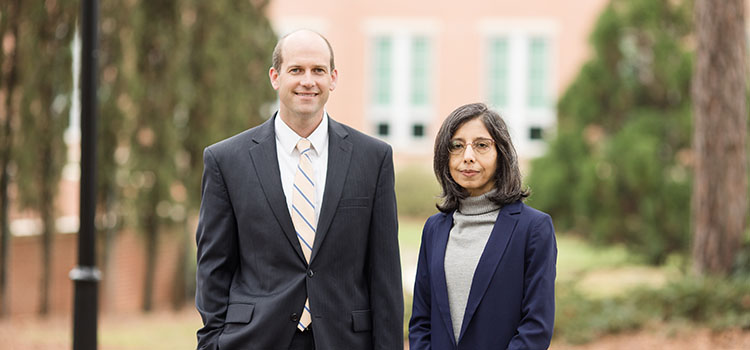Ask the Expert
Posted on January 18, 2023 by MCOB

With healthcare careers in demand, so are administrators who have a dual background in business and healthcare. South is helping meet that need by offering a healthcare concentration as an option in the MBA program – a joint effort of the Mitchell College of Business and the College of Medicine. In this issue’s installment of “Ask the Expert,” Dr. Binata Mukherjee, director of healthcare leadership initiatives in the Mitchell College and an assistant dean of professional and faculty development in the College of Medicine, answers questions about the healthcare concentration from Chris Jett, an alumnus of the Mitchell College who recently served as administrator of USA Health Children’s & Women’s Hospital.
What is the focus of the program?
The focus is truly on being a leader irrespective of the role or rank. Anyone can
rise to the occasion. You see, healthcare is in dire need of people who can bring
radical change to the structure and function of healthcare in this country. We want
students to understand and learn how to be a compassionate patient-focused leader
in the midst of the complexities and idiosyncrasies of healthcare.
What type of students are the best candidates for the program?
The program was initially conceptualized for students, staff and faculty at USA Health
and in our colleges of medicine, nursing and allied health professions who are interested
in acquiring an MBA, but we've found that interest has expanded well beyond that audience.
Generally, the expectation is that students would have some knowledge of the healthcare
system from work experience or prior education or personal experience with healthcare.
Honestly, though, anyone who is interested in learning about healthcare and leadership
is welcome to take the concentration. A few students have taken the concentration
to explore alternate career options. I have had students without any healthcare background
doing well in the class.
How long has the program been in place and why was it started?
The program was approved by the leadership of the University in early 2018 and launched
in fall 2019. The focus of curriculum for medicine, nursing or allied health is on
the development of skills. You’re training how to be a physician, nurse or physical
therapist, for instance. In today’s healthcare world, these highly qualified individuals
have to work in teams, sometimes be a leader and sometimes a follower. It is unreasonable
to expect that these professionals will learn to be a leader on their own and succeed
without help. So why not combine resources available within the University to provide
an opportunity for our students, staff and faculty to learn leadership in healthcare
at the Mitchell College, where leadership is already being taught?
What are some of the tools that students can gain from the program?
First and foremost, the students understand what it means to embrace leadership behavior.
Students are nudged to reflect in order to develop self-awareness and resilience.
Students learn how to be truly customer focused, motivate employees, create learning
environments and psychological safety, mitigate and manage a crisis, lead change in
general and specifically using positive deviance, organize as a high reliability organization,
craft a vision, and systematically analyze profitability of industry/service line/product.
They learn a whole host of tools and frameworks that they can apply immediately in
their jobs.
What are some of the career options for students who go through the program?
Most of the students who have graduated from this program are working professionals
in healthcare. There have been some students who are from other industries interested
in learning more about leadership. Only a handful of students came to the program
to explore a new career path. One such student joined USA Health in an administrative
role.
How important is leadership training in the workforce? In my experience, healthcare systems often take their best employees and put them in leadership positions, but don’t always equip them for these new roles – dealing with issues such as building and retaining a workforce, adopting technology, understanding the need for process improvement, using data for decision making, working in multidisciplinary teams and setting vision for a workgroup.
Leadership is a behavior and it requires deeper thinking and transformation in oneself, in being your better self. Being a teacher as well as a student of leadership is fascinating but challenging. Unlike other fields of study, such as accounting, finance, or English, leadership is not a discipline. There is neither a consensus about the definition of leadership nor a body of knowledge that you may read and be an expert in leadership. If you ask 20 leaders in a room what they considered as core competencies in a leader, there will be a long list that is impossible for anyone to acquire and practice. Leadership is one of the most challenging things to teach; the sooner we start embracing being a leader the better for healthcare.
-

Supply Chain Major Clayton Howell Claims Alabama State Title in Microsoft Excel
The Mitchell College of Business is proud to recognize Clayton Howell,...
February 19, 2026 -

Foundation for the Future: Industry Leaders Invest in Mitchell College Real Estate Program
A new era of the Mitchell College of Business real estate program bega...
February 2, 2026 -

Accounting Students Offer Free Income Tax Prep
Accounting Students in the Mitchell College of Business will be prepar...
January 29, 2026 -

Dr. Mickey Smith Receives Sam and Bonnie Rechter Research Grant
Dr. Mickey Smith, Associate Professor of Management for the Mitchell C...
January 8, 2026
